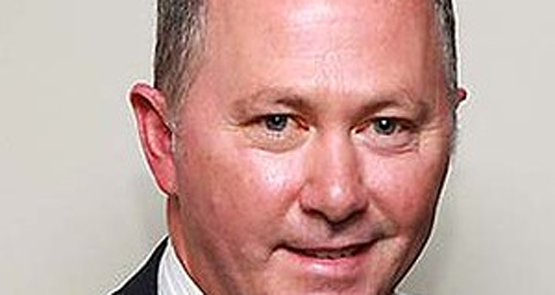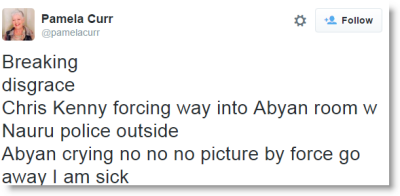A refugee advocate says The Australian’s associate editor Chris Kenny this morning told her his lawyers would be in touch, after she made comments about him on social media and in a group email regarding his interview with a Somali refugee on Nauru.
For Tuesday‘s Australian Kenny interviewed “Abyan”, the 23-year-old Somali woman who claims she was raped on Nauru and sought an abortion in Australia.
He travelled to Nauru to conduct the interview, the first foreign journalist to be granted a visa for the country in more than a year.
But the Asylum Seeker Resource Centre’s Pamela Curr told Crikey she had been on the phone with Abyan at the time of Kenny’s visit, and Abyan expressed a clear wish for Kenny to leave. Curr says Abyan handed the phone to Kenny and Curr herself told him to leave in no uncertain terms.
Shortly after her discussion with Kenny while he was in Nauru, Curr sent out two tweets, one which is today repeated in The Australian’s editorial:
Kenny replied to her tweet:
In a further letter sent to associates, Curr expanded on the allegations. She said she had been speaking to Abyan over the phone when Kenny arrived to interview her. According to Curr, Abyan got off the phone, but then called back saying there was a journalist there and he would not go away.
Crikey spoke to Kenny briefly over the phone this morning asking him whether he had seen the letter.
“It’s full of lies, malicious lies, demonstrably false lies,” he said. “I told her to pull it.”
Asked whether Abyan had been reluctant to speak to him, even if only initially, Kenny told Crikey to read his stories. “You can see what her situation was. She invited me into her room. Second day, was again happy to speak to me, and came out of her room specifically to give a photograph.
“What this woman, Pamela Curr, has written is maliciously false. It is a malicious lie. She must withdraw it and apologise for it, and you must not repeat it.” Kenny then hung up on Crikey.
Curr told Crikey Kenny had called her shortly after 7am this morning demanding she apologise and retract the allegations. Three hours later, Curr says Kenny called her back and told her given she had not apologised or issued a retraction, she would shortly be hearing from his lawyers.
Kenny’s piece, published on Tuesday, acknowledges Abyan had to be convinced to speak to him:
“Abyan, 23, speaks little English and initially suggested she would have nothing to say, referring The Australian to her Australian lawyer, but later agreed to be interviewed in her prefabricated home with her Somali roommate assisting with translation.”
Later on, Kenny’s piece details some of his line of questioning to Abyan:
“In her interview with The Australian, Abyan repeated her claim that she was raped but declined to provide any details about when, where or by whom. She refused to say whether the alleged assault was committed by another refugee, a Nauruan or someone else.”
This was very upsetting to her, Curr says. “He was asking her … who raped you? This would never happen to an Australian woman. There’d be an outcry,” she told Crikey. “You can imagine a journalist and police arriving on the doorstep of an Australian woman who’d been raped. It’s so indecent.”
A second story Kenny wrote for the next day’s paper details some of Abyan’s reaction to the interview:
“Five hours after The Australian’s interview, Nauruan authorities reported that Abyan complained about being visited by the media and had sought medical attention at the local hospital.”
Curr’s letter said that in a second interview, Kenny arrived with police. His second pieces gives his account of the interview. It says three police officers and an interpreter arrived at Abyan’s housing complex and waited for an hour. Eventually they were allowed inside for 15 minutes, Kenny writes, during which Abyan told them to talk to her lawyer. She spoke to Kenny afterwards, the piece states:
“Afterwards Abyan, who had invited The Australian into her home yesterday, again spoke briefly outside her door and agreed to have her photo taken without her face being shown.”
Crikey initially spoke to Curr before her second conversation with Kenny, when she says he told her his lawyers would be in touch.
“The young woman on the phone was distressed and repeatedly asking him to leave,” Curr said in her initial conversation with Crikey. “Why didn’t he do so?”
“I don’t want an advocate v Australian fight. They have more power than us. But the big issue is Abyan — she needs medical care. We want the heat to go out of this issue so the government can make a sensible decision.”











Crikey encourages robust conversations on our website. However, we’re a small team, so sometimes we have to reluctantly turn comments off due to legal risk. Thanks for your understanding and in the meantime, have a read of our moderation guidelines.